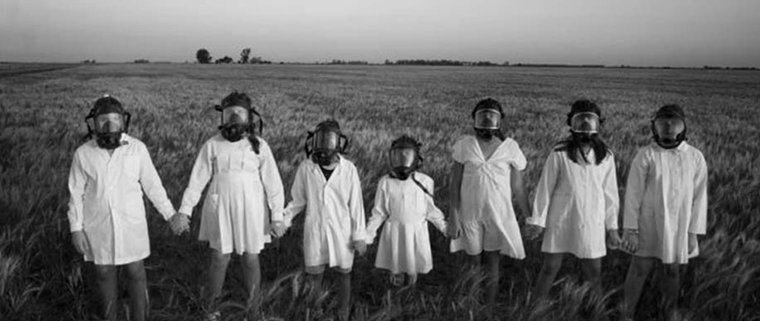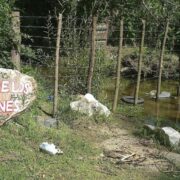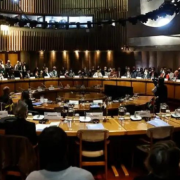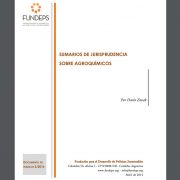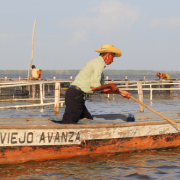Regression in the field of agrochemicals in Entre Ríos
On October 28, the Supreme Court of Justice of Entre Ríos, in the framework of an endless dispute between environmental groups, rural teachers and the Entre Rican government, issued a ruling validating provincial decree 2239/19, which establishes infamous distances of fumigation of the rural schools of said province.
“Below, we offer a google translate version of the original article in Spanish. This translation may not be accurate but serves as a general presentation of the article. For more accurate information, please switch to the Spanish version of the website. In addition, feel free to directly contact in English the person mentioned at the bottom of this article with regards to this topic”.
The judicial dispute began when the Ecological Forum of Paraná (FEP) and the Entrepreneurship Association of Entre Ríos (AGMER) promoted an environmental protection action against the Superior Government of the Province of Entre Ríos and the General Council of Education ( in the cause called the Ecologist Forum “1”). Faced with this action, Chamber II, room II of Paraná, issued a ruling admitting amparo and forbidding ground spraying with pesticides within a radius of one thousand meters (1,000 meters) around all rural schools in the Province of Entre Ríos, and the aerial spraying with the same pesticides within a radius of three thousand meters (3,000 meters) around these educational establishments; all this, until it is determined by the specific state areas that identical preventive effects will be obtained for the health of students and staff who attend them with different distances ”. That ruling was then confirmed by the Superior Court of Justice.
Following this judicial record in the month of January of this year, the Entre Rican governor through a decree (No. 4407/2018), established an “exclusion zone” of pesticide application of one hundred (100) meters radius for the case of land applications and five hundred (500) meters for aerial applications, measured from the center of the hull of the rural school. This new decree, which markedly diminished the protective distances around rural schools, was again challenged by the Ecological Forum of Paraná and Agmer through judicial proceedings, requesting the annulment of the decree.
Such request is based on the fact that the State of Entre Ríos was obliged (by the previous sentence) to carry out necessary studies prior to establishing smaller distances, to guarantee the health of the students and the staff of the rural schools. From this action, the Third Chamber of the Second Chamber in Civil and Commercial, on March 28, 2019, resolved to annul the aforementioned decree, because the Province had not carried out the necessary studies, a resolution that it adopted in a similar sense the Superior Court of Justice of Entre Ríos on May 14 of this year.
Even with all these pronouncements against it, the Government of Entre Ríos, by decree No. 2239/19 (dated 08/01/2019), insisted on reducing the distances of application of agrochemicals around rural schools. On this occasion, it established exclusion distances in relation to the hulls of rural schools, 100 meters for land spraying and 500 meters for aerial spraying. Before this new decree, the NGOs Forum Ecologista de Paraná and Agmer again resorted to justice by filing a new environmental protection, but this time against this new decree, arguing that the first of the sentences already analyzed was affected again. Such action obtained a positive pronouncement from the Third Chamber of the Second Chamber of Civil and Commercial Appeals, which ruled in favor of the amparistas, which decided to dictate the decree in question, under similar arguments as those that were held before the first attempt of the entrerriano Government to limit the distances of protection.
Before this last resolution, again contrary to the interests of the Government of Entre Ríos, and of its intention to reduce the distances of application, he appealed the sentence, finally obtaining a sentence favorable to his interests, at the expense of the protection of the health of students, teachers and staff of rural schools. Thus, the Superior Court of Justice of Entre Ríos, on October 28, ended the judicial course, ruling the validity of the last of the decrees (No. 2239/19).
Its main rationale was that the provisions resolved in the first ruling were transitory and therefore did not have the effect of “res judicata” and that said transience ended with the issuance of this decree. However, and almost absurdly, it raises a ridiculous modification: the 100 meters of shelter for ground spraying and the 500 meters for aerial spraying should be measured, not from the center of the school helmet, but from a plant barrier to be implanted. 150 meters away.
This questionable pronouncement, put an end to the judicial question in the Entre Rican justice. The organizations that were part of the fight for health and environmental rights, chose to continue their way before the Supreme Court of Justice of the Nation. Thus, it will be up to the highest judicial body in Argentina to resolve the conflict in rural Entrerrian schools, ending an issue that will undoubtedly affect all rural classrooms in the country.
Links to each judicial pronouncement:

